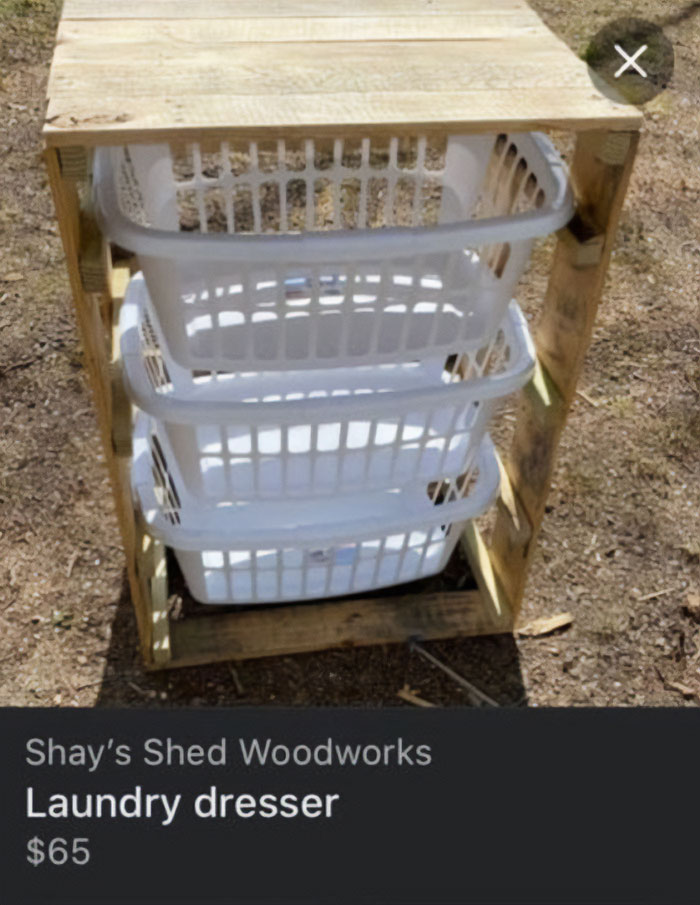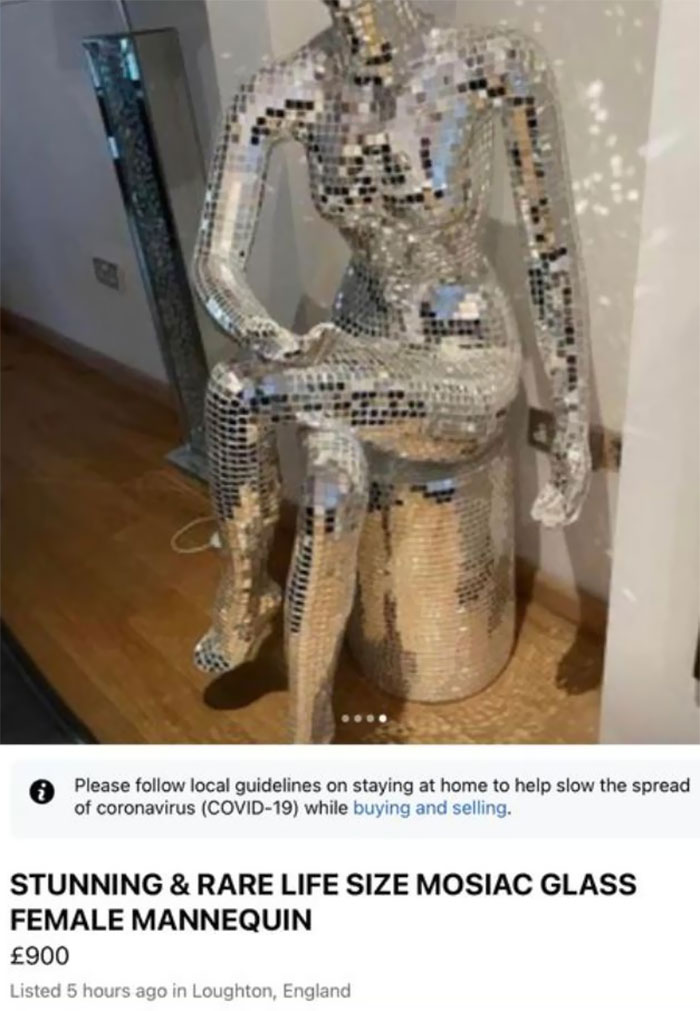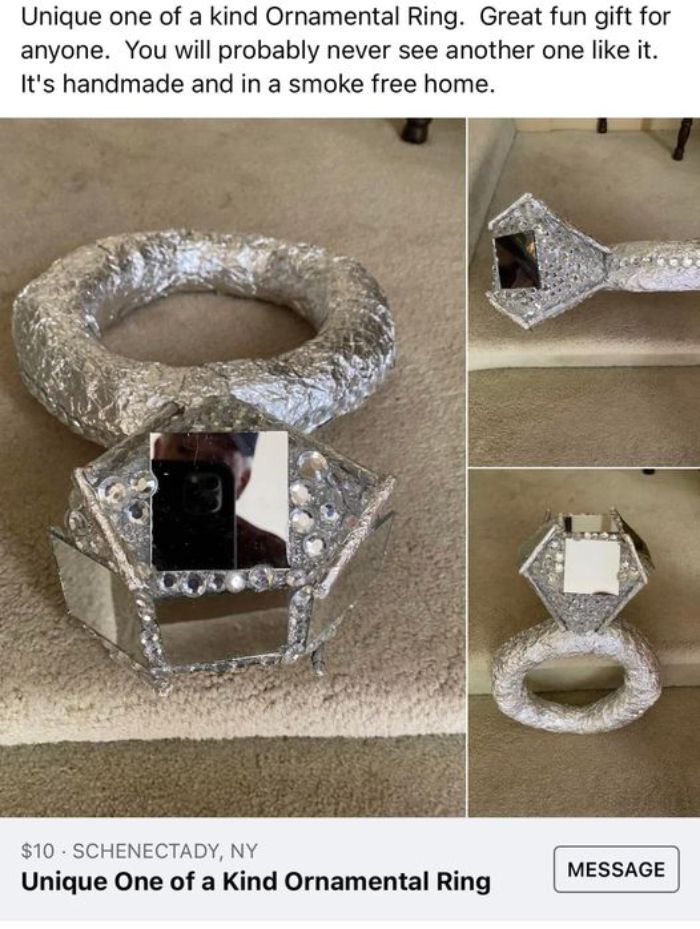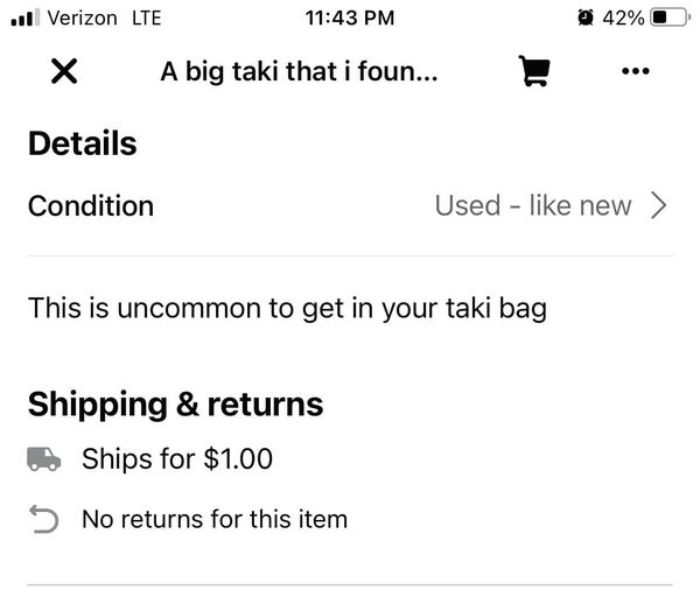
40 Hilarious And Bizarre Things For Sale Online And In Real Life That Got Shamed On This Facebook Group
InterviewThere’s a lot of unintentional comedy to be found on the internet and in real life. And online and open-air marketplaces are an unexpected goldmine of hilarity and weirdness! That’s where the totally awesome ‘Marketplace Shaming’ Facebook group shines best.
A niche online community, ‘Marketplace Shaming’ unites 2.3k online shopping enthusiasts with a great sense of humor. They share some of the most ridiculous marketplace ads ever to be seen, and they’re too good not to share with all of you, Pandas.
It’s truly a clown world that we’re living in, and here’s the proof. Scroll down for some of the weirdest things for sale that deserve to be shamed, hard… but with a cheery smile and a wholesome chuckle. If you’ve got any online shopping enthusiasts in your social circle, be sure to brighten up their day with this list, loaded with laughs. Got any weird experiences with online ads or secondhand shopping scams? We’re all ears—tell us all about it in the comments. Just remember, if it sounds too good to be true, it probably is; and don't take something just because it's free.
Bored Panda reached out to KristL Buckland, the creator and one of the admins running 'Marketplace Shaming,' and she was kind enough to tell us all about the inspiration behind the Facebook group, how to avoid online scams, and why humor is so important. "Be safe, be smart, request a second opinion, read reviews, proceed with caution," she said about online shopping.
Meanwhile, Ariane Sherine, the Editor of the interior design site ‘These Three Rooms,’ told us all about what's in vogue this year, how to strike the right balance when it comes to household decorations, and shared her own ideas on how to avoid getting scammed when shopping online. Read on for Bored Panda’s full exclusive interviews with KristL and Ariane.
This post may include affiliate links.
‘Marketplace Shaming’ is meant for people to share the weirdest, funniest, and most outrageous ads found in real life or browsing your fave online marketplaces.
The sole goal of the Facebook group is humor, so there’s absolutely no room there for any personal attacks, call-outs, or cancel culture. “Treat others as you would want to be treated,” the team running the page point out that rudeness isn’t welcome. Good vibes only, everyone’s here to have a laugh.
KristL, the founder of the group and one of the admins, told Bored Panda that there were multiple reasons why 'Marketplace Shaming' was created. "I offer credit to other shaming pages, such as: 'That's It, I'm Architecture Shaming.' It was the experience of discovering all manner of ads while browsing online platforms that left me wondering 'wtf?' Above all else, it was humor. Humor is always important," she told Bored Panda.
"Relative to the population of the planet, the page doesn't have a large following, but I think that it resonates with some people because other people see ads, wonder, 'wtf?' and are pulled to share the experience. Additionally, there is a playful intention behind the page. I don't truly think most of the ads deserve deep, infuriated shaming in the traditional sense. The shaming we do is lighthearted and speaks to the condition of being human. I am certain that any one of us has, or is capable of producing an ad that is worthy of some lighthearted shaming," KristL explained that playfulness and a lighthearted approach are important.
When it comes to avoiding scams when buying things online, a large part of that is trusting your gut instinct. However, that alone might not be enough. KristL shared some of her own insights on how to avoid getting scammed from her own considerable experience online shopping.
"When trading, buying, or selling items within Facebook interest groups, using apps such as PayPal for secured transactions is one way to protect the transactions. Also, requesting proof of prior successful trades and sales is prudent. If I am purchasing from sellers on Marketplace, I prefer sellers who have a large number of visible high ratings. I also may check profiles to see if the seller appears to be a legitimate person: Do they have at least a few hundred friends? Do they have a long-standing history on the app, or did they just join?" she shared what questions you should be asking yourself when trying to gauge a seller's trustworthiness.
KristL also told us about reversing payments and asking for refunds. "Most apps specifically designed for trading have buyer protection so those apps are generally secure for buying and selling. Failing this system of secured trading or if an online scam occurs and the transaction is done via your bank (as opposed to using cryptocurrency or MoneyGram type payments), there are ways to reverse the transaction. The first step I take is to contact the seller and attempt to resolve the situation directly by requesting a refund. This action will be required by a bank to proceed with reversing a transaction. If it is not resolved, I contact the disputes department of my bank and request to open a dispute. The disputes department will then open up a case and provide steps to take from there."
She continued: "Disputes must be filed within 90 days of the transaction for most banks and the first step is to attempt to resolve the dispute directly with the seller before proceeding. Do not provide a social security number, credit card information, or any other private information over the phone or by email. If any government, insurance provider, or legal institution wants to contact you regarding taxes, insurance, or legal matters, they will do so in writing by snail mail. Any phone call requesting this type of information is a scam," she warned to be incredibly careful with personal info.
"Do not send payment for housing remotely prior to having viewed the home and filled out a tenancy agreement: View the apartment in person. No one will contact you by email if you have a multi-million-dollar inheritance or lottery winning. I doubt that Nigerian princes are as common as our email inbox might suggest. Do not believe these emails. For your personal safety, meet in public places to buy and sell, bring someone with you, or notify someone of your whereabouts/schedule/details about the person or parties you are meeting if you are responding to online ads for housing, jobs, or dates."
According to the founder of the group, 'Marketplace Shaming' doesn't require a lot of moderation, given its relatively small size. "Moderation has been as simple as approving content that is relevant to the focus of the page and removing comments which have moved beyond constructive conversation or playful banter into the realm of upset, bullying, or name-calling," she said.
$80 for the privilege of placing my feet on top of someone else's dried out foot jam? Sign me up! 🤢
For a moment I thought the husband was dismembered and put inside the couch..
"This page is for the purpose of humor, so the challenge is in removing charged comments to maintain consistency with the intention of the page. Not everyone has the same taste in humor, but there is no need to be unkind about differences of opinion. Postings must be approved and there are guidelines listed for participation. While there is room for human error in this system, it has been sufficient thus far."
KristL stressed once again that humor is very important to the 'Marketplace Shaming' community and as a phenomenon in and of itself. "It has the power to acknowledge the human experience and diffuse the emotional charging of difficult situations. Laughter is medicine. Also, real human beings are behind the screen. Remember that and treat others as you would want to be treated. Look up the poem 'Laughter' by Robert Service. It's a good one," she suggested.
Meanwhile, Ariane, the Editor at ‘These Three Rooms,’ was happy to share her own tips on how to stay protected when shopping secondhand on the internet. It’s all about putting in a bit of effort to do some research and double-check that the seller is reliable.
“Ask for several photos and a video call if possible to view the item. That way, you’ll be sure that the seller actually owns it and that it’s in the condition they claim it’s in,” she told Bored Panda.
'Three convenient sizes: Regular, Light day, and GET OUT THE SANDBAGS' 🤣🤣
“Don’t pay upfront, offer cash on collection so you can inspect the item before buying. And don’t be afraid to back out if it’s not what you’re after. A little embarrassment and awkwardness is better than parting with good money to own something you’re unhappy with,” she gave some great advice.
According to interior design expert Ariane, some of the on-trend colors this season include matt black and ‘Americano’—dark brown, coffee-colored tones.
“Warm metallics are also in, so if your sofa has brass legs it’s in vogue. And when it comes to materials, velvet and bouclé and recycled fabrics such as blankets made from recycled plastic are in,” she said. (And we have to admit, we’re not following trends as much as we’d like to, at home.)
Whether or not you get a lot of household decorations and knick-knacks depends on whether you’re going for a minimalist or maximalist look.
“I personally love decorative accessories but it’s essential to have enough space for them,” Ariane, from ‘These Three Rooms,’ shared. “If they’re all bunched up together then your space will look cluttered, but place them at strategic intervals and they can add great impact to interiors.”
Kenny Loggins may look like Jesus, but he ruined Christmas for poor Allie Brosh!
There’s always a chance that you might get scammed when buying something online. UCLA psychology professor Alan Castel, who studied scams for his book ‘Better with Age: The Psychology of Successful Aging,’ recently explained to Bored Panda that scammers can target anyone. However, some people are more vulnerable than others, and hustlers take advantage of this.
"Everyone and anyone is susceptible to scams, especially when we are placed in vulnerable positions, are being rushed, worried, or in an emotional state. While there is a stereotype that older adults are most likely to be scammed, people of all ages, and levels of education, can be a victim of fraud and scam," he told Bored Panda during an interview.
"Scammers know that people respond to social influences, especially to authority, and will use fear and friendliness to create a powerful situation that induces compliance," the professor said.
"In terms of trying to call out a scammer, you need to be careful how, when or why you would interact with scammers, as they often have access to your basic information, and talking to them more can make you a victim, especially if you share additional information about yourself," the professor warned that you have to be very careful when interacting with scammers, even when you want to call them out.
I think all of these food ones are "attempting" to replicate that time someone taped a banana to a wall and sold it for 1mil pounds. And the guy ate it lol
"Scammers work with large volumes and databases, so often it is just a matter of time that someone is going to be caught in a scam. Some advice: Don’t answer the phone, don’t be rushed, don’t provide information, and don’t be afraid to hang up."
When it comes to pushing the boundaries of what inventions and new products look like, it’s vital to have a good balance between function and form. That’s what Steven Wooding, a member of the Institute of Physics in the UK and part of the Omni Calculator Project told us very recently.
"For me, functionality is essential. The item needs to do the job that is required of it. However, it does need to look good, too; otherwise, nobody will buy it or be seen using it. So aesthetics really helps the marketing of a product,” he told us.
"If you make aesthetics too much of a priority, but the product fails in the user's hands, the bad reviews and user feedback will crash sales," Steven said.
"I think the main thing to focus on for an inventor is providing a solution to a problem. So first, gather a list of problems that are in urgent need of solving—you should have no trouble with that. Then brainstorm some solutions—a lot harder, but if you have an inventive mind, you should be able to at least come up with some ideas," he explained.
"Making ideas into reality is a lot harder, and that's where the real work of an inventor happens—prototyping, testing, and refining."
for 10 I take them then I'll go in town and strategically place them in the weirdest spots/cracks in walls or trees
Why is this shame posted? Looks like something people might want at a fair price.
I am sorry to say it, but this is in USA right? Why is always USA ..., 🤔😃
I am sorry to say it, but this is in USA right? Why is always USA ..., 🤔😃

 Dark Mode
Dark Mode 

 No fees, cancel anytime
No fees, cancel anytime 














































































































































